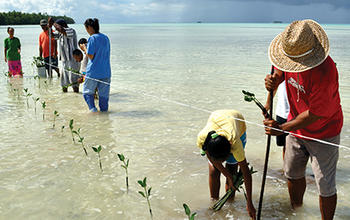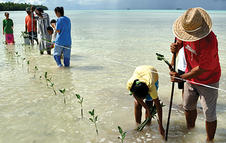
Source: IPCC-wg2.gov
The report, Climate Change 2014: Impacts, Adaptation, and Vulnerability, is the contribution of Working Group II to the Fifth Assessment of the Intergovernmental Panel for Climate Change (IPCC). It highlights the role of local governments in “scaling up adaptation of communities, households, and civil society and in managing risk information and financing”. This reinforces UCLG’s longstanding position that empowered local governments are necessary to effectively tackle climate change.
The urban debate
The report put urban governments front and centre of its examination of climate change by including, for the first time, a chapter dedicated to the issue of urban adaptation. As co-lead coordinator of the chapter David Satterthwaite suggests in a recently published article on the IPCC Assessment, "perhaps we are finally at a tipping point regarding recognition of the need for urban issues to be taken far more seriously in development and disaster risk reduction and now in climate change adaptation and mitigation."
The urban chapter mentions the growing interest of UCLG in this area, and recognizes the work already being done by sub-national governments, arguing that “urban governments are at the heart of successful urban climate adaptation”.
The urban chapter cites UCLG’s GOLD II Report on local government finance to warn of the danger of “unfunded mandates” for climate change adaptation – new responsibilities assigned to urban governments with no corresponding increase in their funding and capacities.
In line with the findings of the upcoming GOLD III Report on local basic services, the chapter argues that “well governed cities with universal provision of infrastructure and services have a strong base for building climate resilience”.
Urban recommendations from the report include:
- Leadership within local governments and also across all scales is important in driving successful adaptation and in promoting and sustaining a broad base of support for the urban adaptation agenda
- Building human and institutional capacity for adaptation in local governments… accelerates implementation and improves urban adaptation outcomes
- Coordinated support from higher levels of governments, the private sector and civil society and horizontal learning through networks of cities and practitioners benefits urban adaptation
- Increased capacity, voice, and influence of low-income groups and vulnerable communities and their partnerships with local governments also benefit adaptation
- Urban adaptation benefits from effective multi-level urban risk governance, alignment of policies and incentives, strengthened local government and community adaptation capacity
For more information on UCLG’s advocacy work in this area, check out our campaign for a stand-alone #UrbanSDG in the post-2015 agenda.
For more info: www.eau.sagepub.com











